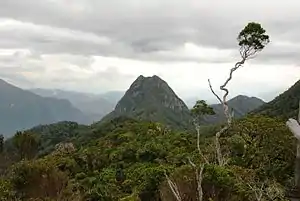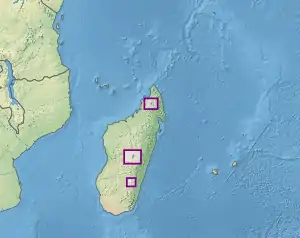Madagascar ericoid thickets
The Madagascar ericoid thickets is a montane shrubland ecoregion, found at higher altitudes on Madagascar's four major mountains.
| Madagascar ericoid thickets | |
|---|---|
 Marojejy National Park, with ericoid thicket on the summits and subhumid forest below | |
 | |
| Ecology | |
| Realm | Afrotropical |
| Biome | Montane shrubland |
| Borders | Madagascar subhumid forests |
| Geography | |
| Area | 1,295 km2 (500 sq mi) |
| Country | Madagascar |
| Elevation | 1,800–2,900 metres (5,900–9,500 ft) |
| Coordinates | 19°25′S 47°12′E |
| Geology | metamorphic and igneous basement rocks |
| Climate type | Subtropical highland (Cwb) |
| Soil types | thin, nutrient-poor |
| Conservation | |
| Conservation status | critical/endangered |
| Global 200 | not included |
Geography
The ecoregion covers the area above 1800 m elevation on (from north to south) Tsaratanana (2,876 m), Marojejy (2,133 m), Ankaratra (2,643 m), and Andringitra Massif (2,658 m). The ericoid thickets are surrounded at lower elevations by the Madagascar subhumid forests ecoregion. The total area of the ecoregion is 1,300 km2 (500 sq mi). On Tsaratanana the thickets are higher up, starting above 2,500m. There are smaller areas of thicket in Anjanaharibe-Sud Reserve in the north and Andohahela National Park to the south.[1]
Flora
The ericoid thickets are characterised by shrubs of the flowering plant families Asteraceae, Ericaceae, Podocarpaceae, Rhamnaceae and Rubiaceae. They include a large number of endemic plants, many of whose closest relatives live in South Africa and the highlands of East Africa. Andringitra alone is home to 150 vascular endemics, including 25 species of orchid.[1]
Fauna
These high points of Madagascar are home to less diverse animal life than on the lower slopes, but with a high proportion of endemics. The area was not thoroughly researched until the 1990s. There are at least ten species of endemic and near-endemic reptiles including the dwarf gecko Lygodactylus arnoulti.[1]
Threats and preservation
The highlands are vulnerable to fire and to conversion to cattle pasture, although Tsaratanana, Andringitra and Marojejy are all protected areas.[1]
See also
References
- Crowley, H. (2004). "84 – Madagascar Ericoid Thickets". In Burgess, N.; D'Amico Hales, J.; Underwood, E.; et al. (eds.). Terrestrial Ecoregions of Africa and Madagascar: A Conservation Assessment (PDF). World Wildlife Fund Ecoregion Assessments (2nd ed.). Washington D.C.: Island Press. pp. 368–369. ISBN 978-1559633642. Archived from the original (PDF) on 2016-11-01.
External links
- World Wildlife Fund, ed. (2001). "Madagascar ericoid thickets". WildWorld Ecoregion Profile. National Geographic Society. Archived from the original on 2010-03-08.
- "Madagascar ericoid thickets". Terrestrial Ecoregions. World Wildlife Fund.